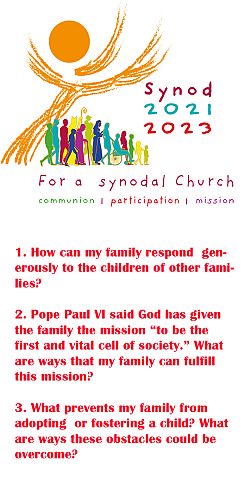Focus on the Family: Adoption and foster parenting can be 'significant expression of solidarity'
(Editor’s note: This is one in a series on the theology of marriage and the family in preparation for the 10th World Meeting of Families, which will take place June 24-26. The worldwide meeting will take place in Rome; Bishop Oscar A. Solis has asked parishes throughout the Diocese of Salt Lake City to host activities to increase awareness of the importance of the vocation of marriage and family life.)
SALT LAKE CITY — Adoption and fostering children are deeply ingrained in the Christian tradition. The Old Testament relates the stories of the adoption of Moses by an Egyptian princess, as well as that of Esther by her cousin Mordecai.
The Church also teaches that, through baptism, Christians are adopted sons and daughters of the Heavenly Father. “God decided in advance to adopt us into his own family by bringing us to himself through Jesus Christ. This is what he wanted to do, and it gave him great delight,” St. Paul reminds us in the Letter to the Ephesians.
Jesus himself was a foster child; his foster father, Joseph, is now the patron of the Universal Church. In his apostolic letter Patris Corde (With a Father’s Heart), Pope Francis described Joseph as a father who was tender, loving, obedient to God, accepting of life as it is, creatively courageous, a worker and a “father in the shadows … He did not think of himself, but focused instead on the lives of Mary and Jesus.”
In the letter, Pope Francis said that “Fathers are not born, but made. A man does not become a father simply by bringing a child into the world, but by taking up the responsibility to care for that child. Whenever a man accepts responsibility for the life of another, in some way he becomes a father to that person.”
Adoption and foster parenting also were mentioned in the final report of the 2015 Synod of Bishops, which met on the Vocation and Mission of the Family in the Church and in the Contemporary World.
“The choice of adoption and foster care expresses a particular kind of fruitfulness in the marriage experience. … This decision is an eloquent sign of welcoming life, a witness of faith and fulfilment of love, …” the bishops wrote.
They added, “… adoption and foster care, rightly understood, manifest an important aspect of parenting and the raising of children, since they make people aware that children, whether natural, adoptive or taken in foster care, are persons in their own right who need to be accepted, loved and cared for and not just brought into this world.”
The bishops, in their report, sounded a note similar to that of Pope John Paul II in his 1981 apostolic exhortation Familiaris Consortio (The Fellowship of the Family), when he wrote, “Christian families, recognizing with faith all human beings as children of the same heavenly Father, will respond generously to the children of other families, giving them support and love not as outsiders but as members of the one family of God’s children. Christian parents will thus be able to spread their love beyond the bonds of flesh and blood, nourishing the links that are rooted in the spirit and that develop through concrete service to the children of other families, who are often without even the barest necessities.”
Children who are adopted or fostered “will be able to experience God’s loving and provident fatherhood witnessed to by Christian parents, and they will thus be able to grow up with serenity and confidence in life,” Pope John Paul II continued. “At the same time the whole family will be enriched with the spiritual values of a wider fraternity.”
Similarly, in the Decree on the Apostolate of the Laity (Apostolicam Actuositatem), Pope Paul VI noted that the family has received from God the mission “to be the first and vital cell of society.”
Among the various ways the family can fulfill this mission is adopting abandoned infants, offering hospitality to strangers and giving helpful advice and material assistance to adolescents, Pope Paul VI wrote.
St. Joseph shows that the bond created by fostering or adoption “is among the highest forms of love, and of fatherhood and motherhood,” Pope Francis said in his Jan. 5, 2022 weekly Wednesday audience. He ended that audience with the following prayer:
Saint Joseph,
you who loved Jesus with fatherly love,
be close to the many children who have no family
and who long for a daddy and mommy.
Support the couples who are unable to have children,
help them to discover, through this suffering, a greater plan.
Make sure that no one lacks a home, a bond,
a person to take care of him or her;
and heal the selfishness of those who close themselves off from life,
that they may open their hearts to love.
Reflection Questions
1. How can my family respond generously to the children of other families?
2. Pope Paul VI said God has given the family the mission “to be the first and vital cell of society.” What are ways that my family can fulfill this mission?
3. What prevents my family from adopting or fostering a child? What are ways these obstacles could be overcome?
© Copyright 2024 The Diocese of Salt Lake City. All rights reserved.


Stay Connected With Us